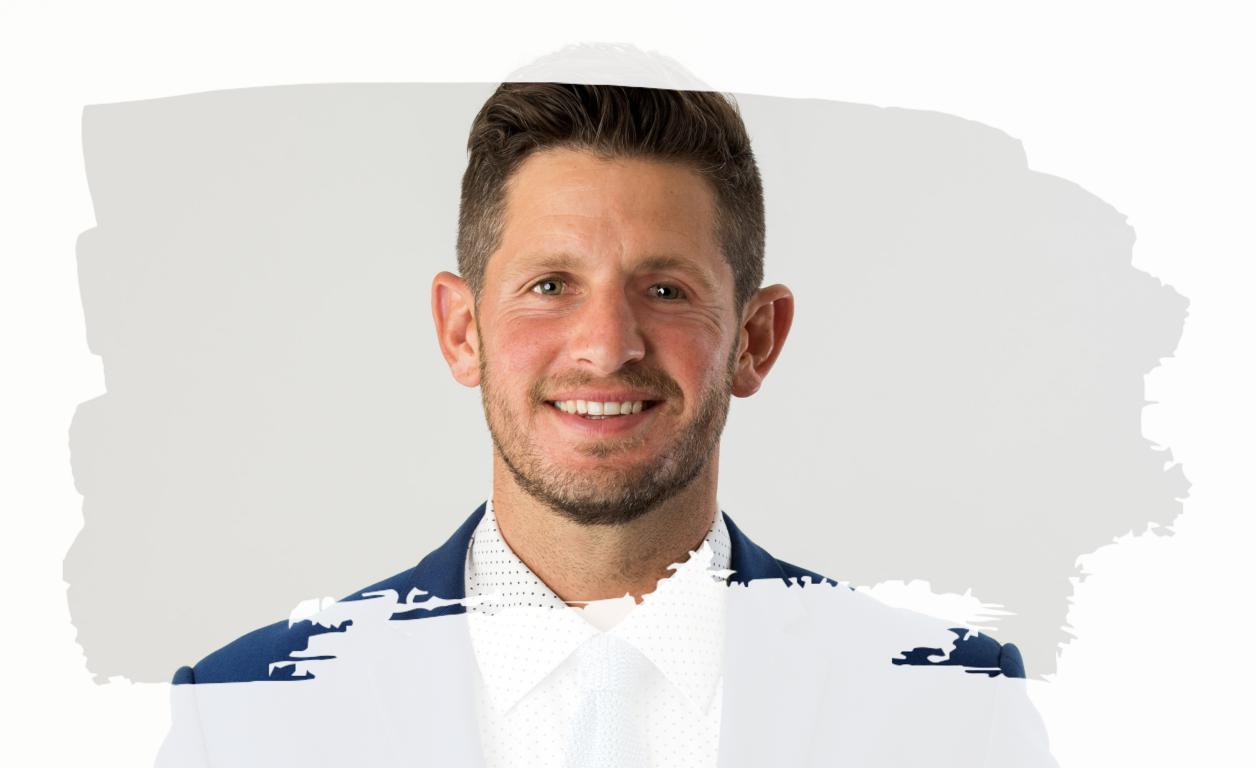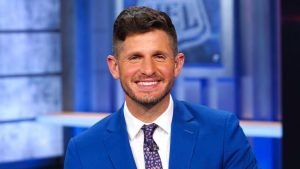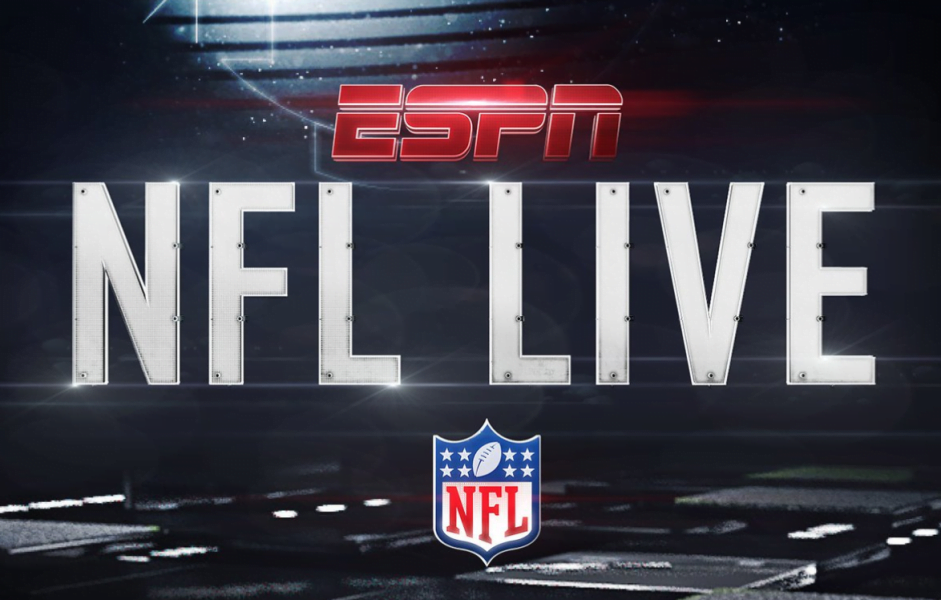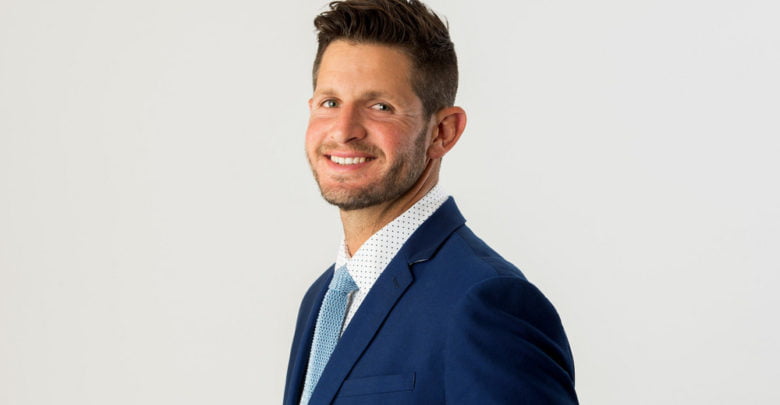
photo via ESPN Press
Inside the creative and musical mind of one of sports most engaging analysts, an interview with Dan Orlovsky
“I want everyone to understand how difficult of a throw this is for a quarterback,”
Dan Orlovsky says while highlighting the strengths of Malik Willis, during an ESPN pre-draft special.
Orlovsky, who was an NFL quarterback himself for 12 seasons, has perhaps found a way to exercise his creative muscles now more than ever – as a NFL analyst.
If the remarkable plays you see on the field each Sunday are the “what”, Orlovsky has become a mastermind in explaining to you the “how” and “why” behind the scenes. Though he has only been in studio since 2018, Orlovsky’ s approach has been something he’s leveraged his entire sporting life. Its actually quite simple – driving off discipline and a relentless work ethic.
“That ball is going to get thrown from about the 39-yard line on the right hash, Okay. This is a NFL throw. From the right hash, wrapping it around the defender I’ve got to drive that ball all the way to the opposite 39, So, that ball is going 22 yards in the air. Right hash all the way outside the numbers and has to be accurate placing right on that guys chest to go make a play,” Orlovsky states with much animation about a throw of Willis’ against Syracuse that he “absolutely loves”.
You can often find Orlovsky with the control in his hand, standing at the big screen within the live studio, walking you throw the mechanics of the given play or player he is speaking of. Though what happens on screen can seem like artistry (see: Patrick Mahomes) it’s what Orlovsky does off screen that makes his explanation so seamless and relatable.
It starts with passion. There’s an abundance of it, immediately recognizable in the delivery of Orlovsky’ s point. Yes, he lived it, he breathed it, he knows what he’s talking about, but furthermore – he believes in it.
“Number two is going to be basically off the defender. This linebacker right here, if he hangs inside and straightens up, I want you to rip that seem.” In common conversation, it’s fair to say you would have not idea what I’m talking about when describing the jaw-dropping play Willis made. But with Orlovsky studying the details of each moment and then presenting it to you in way that allows him to show his words, you see exactly why he’s emphasizing said point. His segment on Willis lasted roughly three minutes on ESPN’s NFL Live. But be assured, it was Orlovsky’s hours of preparation (usually starting at 4am) that allowed him to absorb Willis’ characteristics to a point where he felt the utmost confidence to relay it to a national audience.
In our “How Music Inspires My Life” column, we often speak with sports personalities on the importance of the arts within their personal journey. It became apparent when speaking with Orlovsky (and by watching his segments) that his rigorous approach not only uses every color on the pallet, but also leads to creating colors of his own. Thus, the conversation steered in both directions.
“That’s why Malik Willis has uncoachable traits in the year’s quarterback class,” Orlovsky concludes in this segment. Well, as I got inside both the huddle and film room with Orlovsky in a recent conversation, it became even more apparent why you can say the same about him in his analyst profession.
ESPN announced Orlovsky would be moving up to the #2 announcing booth for Monday Night Football. He also recently tweeted there’s exciting news coming. Whatever it is, you can guarantee he worked hard for it, and he earned it.
As someone who pays close attention to “process” I get the impression that the overall approach to your work and routine is quite creative, is that a fair observation?
I always try to build themes and build stories. There’s that correlation for sure.
Your work is very inspiring because it so passion-led. Football fans have a unique perspective because all of a sudden we just see a former players as an analyst. I know there’s quite a lot that goes into that happening, the transition from player-to-analyst. Can you give us some insight on what that journey was like for you and how ended up on ESPN?
It was pretty quick, considering. But it was really intense. I was in training camp in 2017 with the Rams, it was Sean McVay’s first year. I really thought based off our conversations that I was going to be there for the season basically as a coach for Jarred Goff. I didn’t really do much in in that camp, and at the end, Sean called me in and they released me. In that moment, I was feeling angry thinking, “This isn’t what we talked about.” Sean was dead honest with me about what went into the decision. Right around the time I was done there, within the first week or two I had calls from other coaches within the NFL that wanted me to come get on their staffs – we’d figure out something for me to do helping the offense.
I had played football since I was nine years old, basically 25 years straight. I never had a fall to just breathe. I decided to take the time and not jump into something right away. A month into doing that I felt, “This is cool, but I’m also bored.” Watching games on Sundays, I still had my player and study hat on. I was watching the game the same way I would watch tape in the film room. I knew the teams, players and schemes so well. One thing led to another and I found myself breaking down plays and putting my analysis on the internet. I found there was a thirst for it so it spurred the thought – people think this is really cool and interesting, and I find it fun. It spiraled into a lot of social media growth and attention. Peter Schrager then asked me if I wanted to go on Good Morning Football and do it. It became my niche over a short period of time, which ultimately brought me to where I am today with ESPN.
What really resonates with your analysis work is the “Here’s why” component. Fans can always see or hear about why a particular play or game outcome happened, but to learn about the why behind it brings fans inside the narrative of each game. It creates a connection. You make it look so simple, but there must be a ton of work that goes into the detail you provide. What is your preparation like? Meaning, how much time behind the scenes goes into the design of what you are going to talk about.
I watch every single snap (by Wednesday night) and I go into it without a motive. When I study the tape I’m not going in there with a preconceived notion. I want the tape to speak to me and tell me what my eyes should see. I’ve always said, I just have to trust my eyes. Anything that I find interesting I write down. That formulates my thoughts. When I’m picking a play that I’m going to review on television, a perfect example is on Monday morning Get Up!, we’re probably going to do a play from one of the biggest games that week. As the season goes on, it’s about trying to find ways to tell different stories of whys and hows. One pet peeve I’ve always had in this industry is simply telling people what’s happening. People have eyeballs, it’s not my job to tell you what’s happening. My love is to find how and why it’s happening. It’s as simple as studying every play. While I am doing that – there are themes that you see and stories that get told. Find the things that are different. That’s the competitive aspect of it for me – to go find the how and why.
It takes a ton of work. I’m up at 4 o’clock every morning and spend every day watching tape while my kids are at school.
To confirm, when you say every snap – you’re saying you watch every play of every NFL game each week?
Yes, every single play. I will not go on television and talk about a game if I have not watched every single snap of that game.
Wow, that’s incredible dedication. One thing I’ve noticed through the stories you do tell, is that there’s creativity in today’s game. For example, when I would watch you detail Kenny Pickett’s play, you often emphasized the improvising. Do you find the NFL today to be in it’s most creative state in terms of the play on the field?
It allows for it, but it doesn’t force it. To be creative as a quarterback is not a necessity in today’s NFL – if you do all the other things well. It’s a luxury. Mac Jones for example, doesn’t have to be a creative quarterback because he does a lot of other things well. Patrick Mahomes went through this a bit. Just because you can doesn’t mean you should. These guys are so young and gifted. Stop telling everybody young quarterbacks are not ready. Their pure athleticism can allow them to survive early on. Those same things will allow them to thrive down the road. So, if you have that creativity, it elevates you as a player.
I’ve noticed you are a fellow notetaker, always jotting things down in notebooks. How important is it for you to stick to that process?
I’m a huge notetaker, it’s non-stop. I believe in it, it’s how I learn. I’m a big repetition person. I started taking notes as a teenager in sports. It’s been one of the backbones of how I go through each experience in my life. I’m still the person who writes down the things I have to do on a daily basis. I literally have a 4×6 planner of the things I have to do each day. I like writing something down and then crossing it off. I feel accomplished in that way. Notetaking allows me to flow through thoughts and really summarize what I am trying to say. I’ll then look through everything I wrote and find the most punch-worthy thing and then it hits me, “That’s the first thing that I’m going to say.”
You seem to have a tireless work ethic. Would you say the work ethic you have now is the same as it was when you were playing in the NFL, just channeled differently?
It’s very similar. My work ethic was a big deal early on in my life. My dad instilled that in me because nothing was given to me. I’m forever thankful for that. It’s probably maniacally. I believe you have to have an obsessive work ethic in whatever it is if you want to be different and great at it. I tell people, I was a six-foot-five, 180 pound junior in high school who ran a 6.2 in the 40-yard-dash. I didn’t play college football because I was super-talented. So working hard is very much still of who I am and something I try to teach my kids. It’s stood the test of time of being the separator. It’s never failed me so I’m certainly not going to not relay on it now that I’m in the TV, analyst world.
What’s something professionally that you are still working towards? A work goal you are trying to achieve?
Professionally, my goal is always changing. I want to be a well-respected and dominant voice in this industry. I don’t know what that landing spot is going to be in three or five years, but I want to continue to work at it and be valued at it. Most importantly, I want my kids to remember me as their dad as opposed to the person in their house that was on television.

photo via ESPN press
Do you have a certain music that you put on when you are alone doing your preparation work prior to going on-air? Something that gets you in the zone?
I’m usually listening to The Message on SiriusXM, especially if I’m driving to work in the morning. Or country music. Those are the two things that I listen to the most. I am a music person for sure. I grew up on sports in locker rooms, so there was a ton of ACDC, Metallica, Ozzy Osbourne, Public Enemy and Eminem. My college days were all about hip hop. I really got into country music when I got into the NFL. I still workout every day. When working out I go back to the music I grew up on. When I’m studying, I put on something just to serve as background noise.
What about before a big game? Did you have a particular artist you would listen to?
I’m not a very superstitious person where I needed to listen to a particular song before I game. I was always in the moment. In the NFL on Sunday mornings, I was most likely watching church or listening to christian music. Whatever music was getting played in the locker room though, I was cool with.
When you look at the different cities you played in, there’s a unique music culture to each of them. Detroit rock city, Houston, Tampa, they are all very different cultures. Does you have any memorable music moments from any of those areas?
Detroit a little bit. I grew up with my high school years being all about Eminem. It was so cool to be on his turf all those years. I was young when I got there, so that was the one that grabbed me the most. I never knew about Houston’s deep musical history until I moved down there.
Quick Hits:
First Concert – Kenny Chesney with my wife at Lincoln Financial Stadium.
Favorite Concert – Old Dominion or Thomas Rhett both were also in Philly.
The Next Concert You’re Going To – Kenny Chesney
Favorite Artist – Luke Combs
Advice you give to youth athletes – Embrace failure and difficulty. It’s part of sports. The best people in sports are those that don’t allow what happened in the past to negatively impact what can happen in the future. Be coachable – coaches are supposed to tell you the things you are not doing well. I’ve you listen to them knowing they have what’s best for you in mind, you will get better. Don’t complain about the things you don’t get for the work you don’t do. Focus on the little things because those become the big things. Being a good teammate is just as important as being a good player, if not more. There’s plenty of people in the sporting world who will tell you what you cannot do. Find ways that you can tell your teammates about the things that they can do. Lastly, understand you are a kid. You’re going to play a lot of games. Focus on keeping your team in the forefront of everything. Your not going to remember all the hits you had or goals you scored, but you are going to remember the feelings you had when your team won or lost, and from the overall sporting experience, that’s what it’s all about.
Catch Dan Orlovsky on ESPN’s NFL Live, weekdays at 4pm EST.


photo via ESPN press


